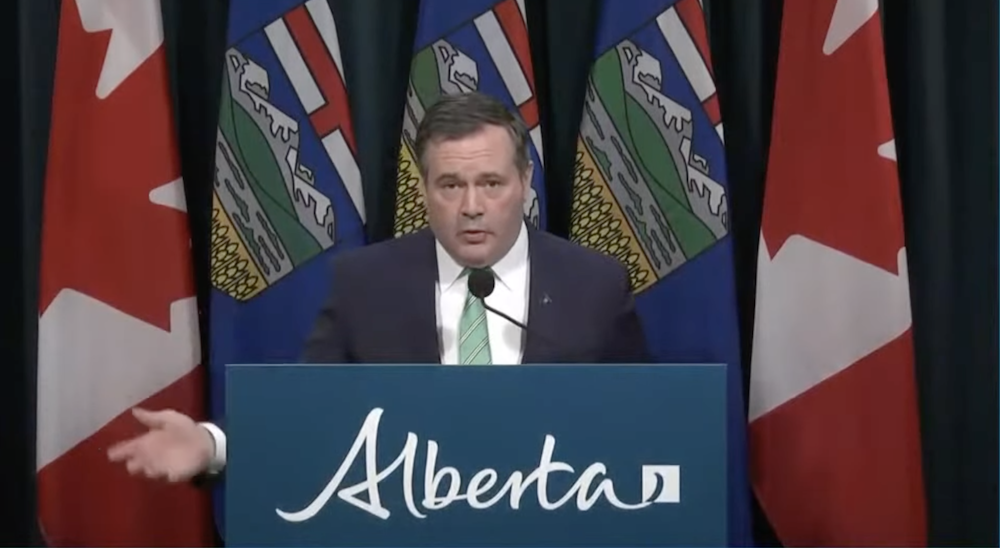There were exactly zero policy surprises at Alberta Premier Jason Kenney’s afternoon COVID-19 news conference on Tuesday, where—predicted by everyone everywhere—Kenney pulled the plug immediately on the province’s vaccine passport—which was euphemistically known as the “Restrictions Exemption Program,” so he could deny ever having implemented such a thing.
By the time you read this, it will be gone—although the smartphone app will be kept up to date for a spell so Albertans can ride on federally regulated airplanes and enjoy winter holidays in warm places.
What impact this will have on the province’s hard-pressed hospitality industry is less certain than the premier would like you to think, as it’s likely to drive away as many cautious customers as unvaccinated ones it attracts.
Capacity limits for indoor venues mostly also disappeared at midnight, and mask mandates for children under 12, including in schools, will be gone by Monday morning.
This infuriated teachers, already fearful about the impact of Education Minister Adriana LaGrange’s letter yesterday telling school authorities they “cannot deny their students access to in person education due to their personal decision to wear or not to wear a mask in schools.”
And it frightened parents, particularly of kids under five who can’t yet be vaccinated. The government did not consult parents, teachers or school boards.
This is all part of what the government called “a careful and prudent plan to phase out public health measures” and many government opponents dismissed as a craven surrender to the to the outlaw convoy blockade disrupting the main border crossing to the United States at Coutts, supposedly because of their opposition to vaccine mandates.
Neither of these interpretations is quite right, in my view.
Certainly Kenney was being economical with the truth when he forcefully denied the “shift to a balanced approach where we are able to live with COVID-19 and return to normal” had anything to do with his determination to survive his United Conservative Party leadership review in Red Deer on April 9.
Everything this man does is political. But if he was caving in to anyone, it was the members of his own influential anti-vaccine rural caucus, some of whom he’ll need to help him keep his job, not the actual blockaders.
As for getting the border open again, it’s unlikely he cares much about that when it’s so easy in southern Alberta to toss that hot potato into Prime Minister Justin Trudeau’s lap.
Either way, it’s telling that after a pusillanimous press release from acting Justice Minister Sonya Savage earlier in the day suggesting the blockaders at Coutts really ought to respect the rule of law and abide by the wishes of local residents, the truckers shut down the highway again completely.
If the RCMP and the government really want to end the blockade and open the highway, they’re going to have to do something they haven’t yet tried—enforcing the law.
So if it wasn’t the actual policy announcement, what was it about the premier’s press conference yesterday that made many Albertans want to prematurely give up on their ‘Dry February’ pledge?
Could it have been the sheer gaslighting of Kenney’s effort to plead for Albertans to heal their differences over COVID-19 mitigation measures?
“Unvaccinated people are being treated like people with AIDS in the 1980s,” Kenney said, oozing earnestness, as crockery dropped and profanities exploded all across the province.
Large numbers of Albertans remember Kenney bragging as a young MP about how at the height of the AIDS crisis in the late 1980s while attending university in San Francisco he helped overturn “the first gay spousal law in North America”—cruelly preventing survivors from visiting their dying partners in hospital.
Or perhaps it was the cognitive dissonance of hearing the premier who promised in July 2020 to let municipalities make their own mask mandate decisions explain why that would now be a terrible idea.
When rural municipalities wanted out of the province’s reluctantly imposed mask mandates, Kenney had this to say: “We’ve said we’ll respect a decision of municipalities in that regard. We think these decisions are better taken locally. This is a huge and diverse province. The challenges that a very dense city might face on crowded buses couldn’t be more different than a remote rural municipality where there are no active cases. So we think a one-size-fits-all approach for a huge vast, diverse, province like this doesn’t make sense.”
Now that big-city mayors are worried about the impact of dropping mask mandates while the Omicon variant continues to surge, this is what the premier said yesterday: “I’d like to know if it is their intention to create an entirely separate municipal public health policy that is different and apart from that of the province. I would think that would be a serious problem. … I think turning public health policy like this into some kind of a local political football is not helpful, it’s not conducive to public confidence in the public health parameters, or in the clarity of what the rules are from one part of the province to another.”
Or maybe it was just the way he turned up for the newser 20 minutes late, like he so often does, without uttering a word of apology.



